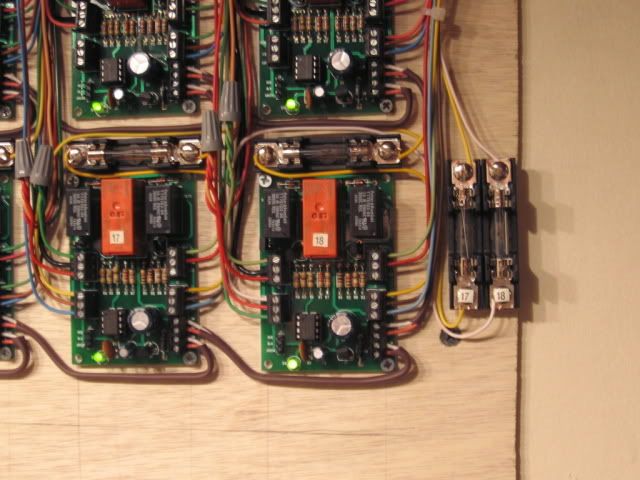Originally Posted by Bucky:
Originally Posted by Dale H:
If you use micro switches make sure they have current carrying capacity if you are switching track voltage. Heavier current carrying switches are usually heavier to throw. radioshack is usually expensive. Try Allelecctronics.com
Dale H
Thanks, Dale. Earlier you said you have "12 VDC with screw terminal sockets 10 amp." Why would 12 VDC coil ones work with the AC DZ-1000 switch machines? I don't know diddly about this stuff.
I throw my Ross tinplate switches with relay contacts and do not use the push buttons supplied with the DZ1000 machine. I have an automated passing siding described here
www.jcstudiosinc.com/BlogShowThread?id=856
https://ogrforum.com/t...ss-tinplate-switches
The one I actually use is more complicated as the siding parks 2 trains each.
Anyway the point is you can throw them with a spdt switch. A relay is just an automated switch. So if you use a DPDT toggle the second contact set can power a block signal or whatever to indicate switch position. You dont need a relay for that. With that switch you could also drive a 3PDT relay if you want to power blocks and such. It all depends on what you want to do and your needs.
I can not comment on an anti-derail circuit I dont use it,I would have to think about it. I simply throw them in tandem the way I want them.
My relays do not neatly plug into the machine you would have to wire them under the layout. There are a lot of ways to do things I can not comment as I do not know the details of your layout.
If you look at the end of this post,you will see a pic of one type of plug in relay
www.jcstudiosinc.com/BlogShowThread?id=410
As you see DC relays can be used with AC by adding a bridge rectifier and a capacitor. 12VAC in will work either a 12 VDC or 24 VDC relay with no problem.
I sell them at my cost which is $8, the plug in socket and relay. They are DPDT,I may have some cheaper SPDT ones somewhere. I have some 24VDC,12VDC and 24VAC I think. I dont make money on them doing it. I never heard of one burning out from people using them.. The circuit should have protection from shorts to protect the 10 amp contacts. Relay bargains are all over Ebay so you can buy your own and save,I do not push them.
The cheapest relay you can use is an automotive relay. They cost maybe $2 have 40 amp contacts and 12VDC 88 ohm coil.
two are shown used here to save money for someone wanting an inexpensive circuit used in conjunction with 12 volt timer modules
www.jcstudiosinc.com/BlogShowThread?id=478
Dale H
Wow, thanks for all the information. You stated that the circuit should have protection for the 10 amp contacts. I assume you mean the contact side of whatever relay used should be fuse protected?



